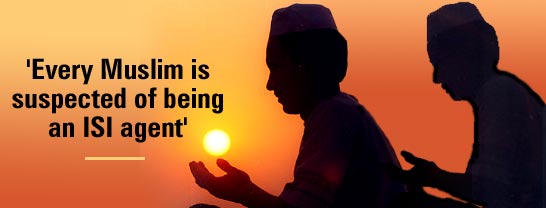Home > News > Specials
The Rediff Special/Ehtasham Khan
September 19, 2003

The last of a four-part series. Read from the beginning.
She is 22, a medical student at Aligarh Muslim University. What makes her different from her peers is that she is a member of the banned Students Islamic Movement of India.
When she is not studying, she reads the Koran, memorising verses that strike her, explaining and interpreting their meaning to friends.
Referring to the Mumbai blasts in which SIMI members have been accused, the burqa-clad girl says, "This is no jihad. SIMI cannot do this. We are not taught to kill innocent people."
The government, she says, is blaming Muslim organisations and individuals to defame the community.
In support of this thesis, she cites the example of Abdul Mobin, a SIMI activist and former AMU student, who was arrested for the bomb blast on the Sabarmati Express train at Agra in 2000.
"The police have not yet proved Mobinbhai was involved in it," she says. "Only innocent people are caught and victimised."
Why is the government targeting SIMI? "They [government] target all Muslim institutions because we are doing well. We have our reach in all sections of the society.
"They have read the Koran and it is written there that Islam will dominate and rule one day. So they are scared of Islam. There is an international conspiracy to suppress Islam," she says.
She discovered SIMI in school. In 1995, she formally joined the organisation as an ikhwan, or basic member. After three years, she graduated to ansar, or senior member.
She feels jihad is being misinterpreted today. "Jihad starts by controlling our own self. Not doing any sin is jihad. Violence comes at a later stage and it should only be used as defence and not to harm an innocent."
Will she ever take up violence? "Yes, I will if the need be," she says.
But the situation today doesn't call for violence. "It demands patience. We should empower ourselves politically, financially and educationally and prepare ourselves."
Indian Muslims are backward, she feels, because all successive governments have betrayed the community. "The BJP is doing everything openly but the Congress stabbed us from the back. It was the Congress government that opened the locks of the Babri Masjid [in Ayodhya]. The BJP later pulled it down."
To survive and thrive in India, she says, Muslims must take control of power.
"Muslims should aspire to reach all top positions, be it in politics or business," she says. "Then we can spread our religion."
She is upset many educated Muslims move away from Islam under the Western influence. But she firmly believes there will come a day when the world is one big Islamic state.
"This will happen sooner or later. Islam has to rule the entire world. We are fighting for this.
"But we will not convert others to Islam as Christians do by luring poor people. The Koran is for everybody and we will invite them to enlighten themselves."
But why does she want an Islamic rule? "We don't believe in democracy. Islam is the best way of living. Islam advocates justice and rule of law. We are upset by this democracy where we are suppressed.
"Every Muslim is suspected of being an ISI agent," she says. "The situation is bad for all minorities. There is so much of disparity among the people. What has this democracy given us?"
A rule of SIMI, which she aspires for India, would be just and fair.
"SIMI members are disciplined and they spend their life with a principle," she says. "I have learnt about my religion and how to face the world in SIMI."
Earlier, she used to attend SIMI sessions. She was taught public speaking and educated on religious and political issues. As SIMI activist, her work involved teaching others what the Koran says -- and she had to make monthly reports about her progress.
"We were trained how to approach non-Muslims and what issues to talk to them," she says. "Generally non-Muslims have wrong impression about Islam and Koran. We wanted to correct that image.
"We organised discussions on social and political issues like women's rights. Everybody was invited and we had healthy discussions. This is what we used to do, but we are portrayed as terrorists."
SIMI membership was given on the basis of a person's interest in the Islamic cause. But when SIMI was banned for fomenting religious divide in the country, its leaders went underground and many members quit. And so, while there were 150 SIMI activists in Aligarh before the ban, there are only 50 now.
A teacher at AMU, who has closely watched the rise and fall of SIMI, says, "SIMI was a confused organisation. They wanted to establish an Islamic state but didn't know how to do it.
"There was a debate within the organisation whether to adopt violent means or not. They gave fiery speeches and wrote heated pamphlets but didn't have the potential to do anything.
"They thought the community was with them. But that was an illusion."
Design: Uday Kuckian